Oh my, oh my, oh my - such beautiful music was played last night! This centennial of the end of the First World War is inspiring many in the arts world to commemorate the end of one of humanity's worst perpetrations against itself, in the hopes that humanity will learn...which of course we don't.
We are so lucky to have a wonderful friend who sings in the Symphony Choir of Johannesburg, who is currently out of the country and kindly offered us (@tim-beck and me) tickets to this event.
Although I've been lucky enough to live in countries that have not been at war while I've lived there, I can't count the number of wars which have raged around the world while I've lived my (getting on to) six decades here on this blue dot.

Last year we visited the Delville Wood cemetery and war memorial, as I described in this post. Seeing the evidence of so many thousands of young men - teenagers, many of them - cut down before they could live their lives was a graphic reinforcement of my deep antipathy to war, and my abiding gratitude for their sacrifice so that we can live our lives in freedom.
Last night's performance
Last night's epic performance of Benjamin Britten's War Requiem showed me that artistic opposition to war can be devastatingly effective.
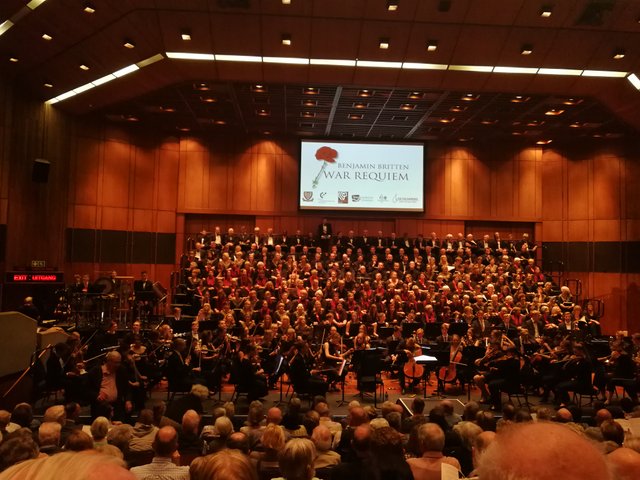
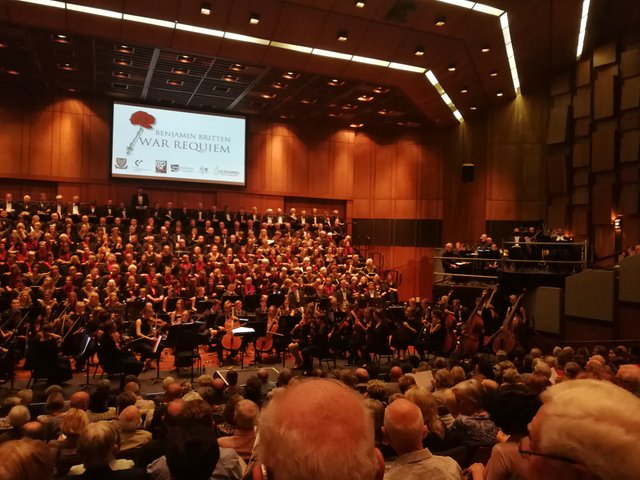
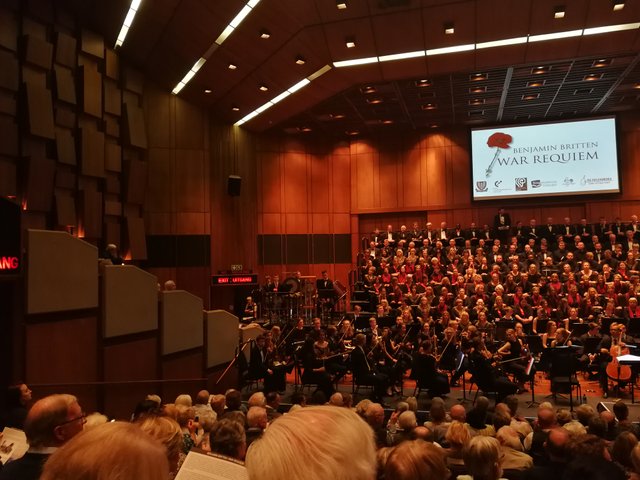
I was a bit circumspect in taking these photos and took them without flash - didn't even try to create a panorama as I didn't want to disturb those around me and frankly wanted to listen to the performance.
However, what is difficult to convey in these three photos is the impact of walking into the auditorium and seeing this wall of people who were about to make music. I suspect the most we've ever seen there at previous concerts may have been half the number of performers gathered at this performance last night.
If we understood our "host" conductor, Richard Cock, correctly, this was the first time since 1967 this piece has been performed in Johannesburg, and while it may not be the last the chances we'll see it here again are infinitesimal.
A few facts before we dive into some reflection.
The program
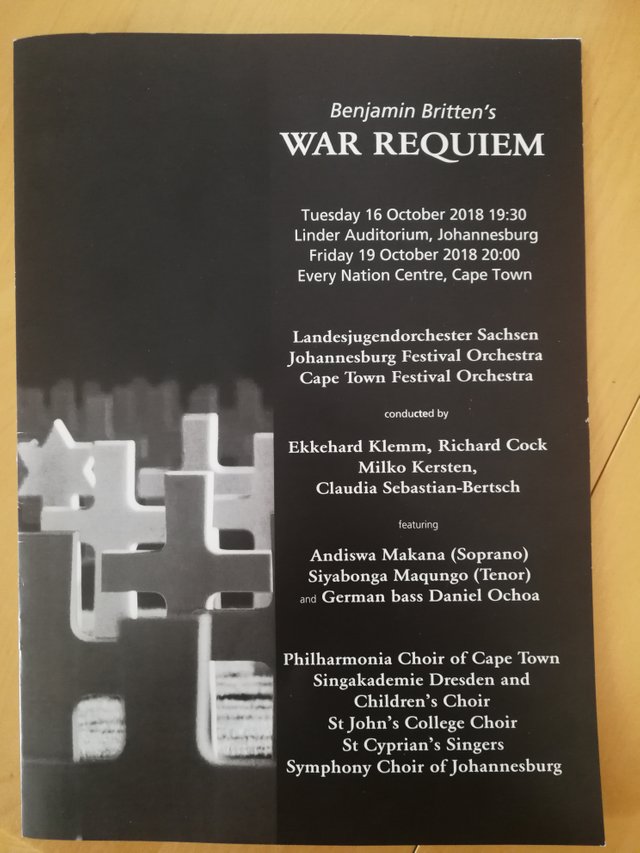
Who?
As you can see from the cover of the program, an absolute smörgåsbord of talent was involved in putting on this ambitious production. It included three orchestras, four conductors, three soloists and five choirs (I think - more on the numbers below) to put on performances in Johannesburg last night and in Cape Town this coming Friday.
The orchestras last night
The orchestras
- Landesjugendorchester Sachsen (the Saxon Youth Orchestra)
- Johannesburg Festival Orchestra
played in two separate locations.
I think the Saxon Youth Orchestra were on the floor and to the left (the first and third photos of the performers above) and the Johannesburg Festival Orchestra was in the balcony on the right (second photo).
The conductors
We could see two conductors, Richard Cock conducting the Festival Orchestra and two of the soloists in the balcony, and Ekkehard Klemm in front, conducting the combined choir and Youth Orchestra.
A third conductor, Claudia Sebastian-Bertsch was cunningly ensconced above, behind and to the left of us in the upper balcony - she was conducting the children's choir, which I think might have been a meld of the Singakademie Dresden's children's choir and St John's College Choir.
A short word about Richard Cock: without him, the availability and accessibility of classical music to ordinary Johannesburgers would be in serious peril.
Ekkehard Klemm's life and career have been intimately linked to Dresden, a city which was outrageously bombed flat towards the end of the Second World War.
The soloists
The two male soloists were a baritone and a tenor. In the introduction, Richard Cock took care to point out that the baritone, Daniel Ochoa, had roots in Africa as one of his parents was from Equatorial Guinea. Siyabonga Maqungo, the tenor, is one of Joburg's amazing upcoming talents.
The soprano...ah, the soprano...Andiswa Makana. She of the sublime, rich, effortless, expressive, perfect voice; another local talent whose development has been supported through public sector education as well as private philanthropic trusts.
The choirs
We are reasonably sure that last night we listened to the Singakademie Dresden and Children's Choir, the St John's College Choir and the Symphony Choir of Johannesburg.
The composer
Benjamin Britten, in addition to being one of the twentieth century's greatest composers, was also a committed pacifist.
The poet
Wilfred Owen, a British poet, is known for his war poetry.
Wilfred Owen, who wrote some of the best British poetry on World War I, composed nearly all of his poems in slightly over a year, from August 1917 to September 1918. In November 1918 he was killed in action at the age of twenty-five, one week before the Armistice.
One week.
What?
The War Requiem was commissioned for the consecration of Coventry Cathedral in England in 1961. It incorporates excerpts from poems by Wilfred Owen as well as the Latin text for the Mass for the Dead. The Cathedral had been rebuilt after being bombed flat during the Second World War. As the program eloquently summarises:
Britten prefaced the score of the War Requiem with a quote from the preface that Owen wrote for his book of poetry (published posthumously): "My subject is War, and the pity of War. The Poetry is in the pity. All a poet can do is to warn."
The program goes on to explain:
The War Requiem, a monument to both world wars, is constructed on three levels: (1) baritone and tenor soloists, and small orchestra to represent piercing irony; (2) soprano soloist, chorus, and large orchestra to represent the ritual invocation of God's mysterious presence; and (3) children and organ to represent innocent hope. Overall, the work represents the search for "a vision of eternal peace which warring man cannot, of himself, achieve."
By way of introduction, Richard Cock asked his wife Sue to give a foretaste of the musical experience the audience was about to have - she described it as "soul-changing" and perhaps the equivalent of a film score, a film we would each have to play in our minds as we listened to the music. (Okay, I thought, we watched the film Dunkirk last year - that should do it.) She left the stage saying, "I won't tell you to enjoy this - I will tell you that you'll be changed by listening to it".
The six movements take the concertgoer through the experience of war and death.
Where?
This concert was held at the venerable Linder Auditorium, on the main campus of the University of the Witwatersrand.
Enough of the W questions, how was the concert?
The concert opened with a hauntingly beautiful choral introduction, Wie liegt die Stadt so wüst? (How is the city so desolate?), composed by Rudolf Mauersberger about the sacking of Dresden. Mauersberger was the choirmaster that the young Ekkehard Klemm first learned his craft from in Dresden.
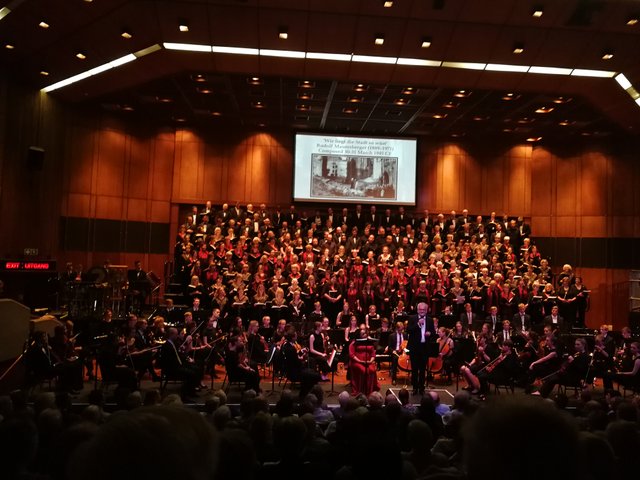
This short choral piece was so heart-wrenching it was all I could do to contain my tears.
The six movements indeed took us through war and death, in a most unexpected way - the best word I could use to describe it would be "SurroundSound", as we had the wall of sound in front of us as well as the children's choir above and behind us. The music didn't have any "greatest hits" or "showstoppers", rather it was a musical depiction of the depressing reality of war and death, with the lyrics displayed on the screen above the choir for us to follow along. The Latin lyrics were translated into English, and Wilfred Owen's devastating words were also displayed.
Most extraordinary for me was that often the entire host sang different pieces together, in different languages and almost tonally clashing. Sometimes the percussion was meant to sound like the explosions of war. Sometimes the brass section picked up on the calls of war. It was so effective to hear those sounds sometimes played loud, and sometimes played so softly we could barely hear them.
And the soprano...oh my goodness. I don't have the musical vocabulary to describe her voice and her performance. I will simply say that her performance was sublime and as close to a perfect interpretation of a piece that I have ever enjoyed live. I hope she has an extraordinary and illustrious career.
Musically, this concert was of a calibre we are privileged to hear only seldom in this country.
On reflection
Do we learn? No.
Do we mourn? Yes.
Do we yearn for a world of peace? Yes.
Can music help? Yes, by spreading the message of peace through the arts, which reach people in ways which words and rhetoric cannot do.
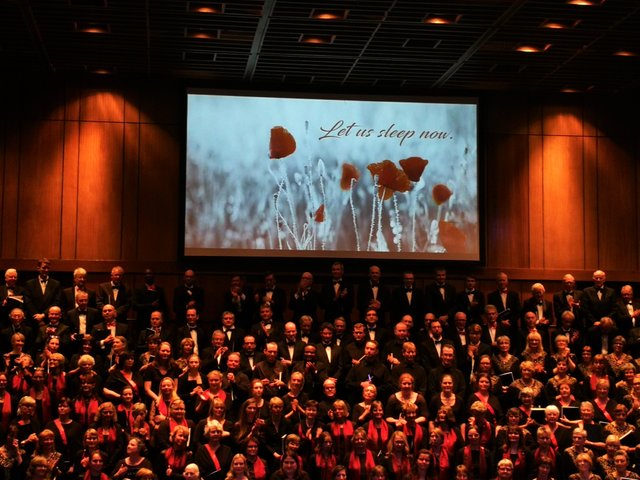
Please wear a poppy on November 11th to commemorate those who sacrificed themselves so we could live free.

Team South Africa banner designed by @bearone
Excellent synopsis of this concert! I read and my skin is bristling with emotion. I can imagine being there and I'm really excited. I believe that the arts can not only serve to offer beauty, relaxation, but also to make us change our attitude towards life. The fact that there are artists like the poet Wilfred Owen, who at an early age tried to express himself against war beyond his life, is a thread of hope! The fact that there are groups, orchestras, people promoting the language of peace makes us still keep alive the faith of a better world. Let us change weapons for musical instruments, brushes, pencils. We still have time to change!Thank you for sharing such a moving experience and such beautiful images, @kiligirl
Downvoting a post can decrease pending rewards and make it less visible. Common reasons:
Submit
I am so moved by your reply, @nancybriti. I wish I knew more about the backstory to this concert - my friend has told me a little, but clearly the choir was dedicated to putting on this performance as they budgeted it at a significant loss (fun fact: the more performers they have, the less room there is for paying customers...but they did it anyway - just wow). Thank you so much for your uplifting comment! 💗💗
Downvoting a post can decrease pending rewards and make it less visible. Common reasons:
Submit
What an exceptional article, emotionally charged music to make one think, your words make it tangible @kiligirl
Raised in a family, attending parades all my life, this sends shivers up the spine to think of honoring people who put their lives on the line, to ensure better living for those to follow. (Sadly humans never learn.)
My father and his brothers served throughout WW11 in North Africa and Italy, their sister also was in uniform in a typist pool during the war years. Born from 1905 to 1911, my Dad the youngest, all came home. A cousin of my Mom lost his life in Italy, my parents visited his grave in the late 1970's.
If I had sat through an orchestra with choir I would have cried, beauty in song, emotional ties to events, not mentioning my grand-parents who also took up arms when called upon, yes it would have been a night to remember!
Downvoting a post can decrease pending rewards and make it less visible. Common reasons:
Submit
I think you would have really enjoyed this performance, @joanstewart. I can only imagine what it was like growing up with those who were in active service. I'm happy for you and yours that at least your brothers all came home. Sad that any young person has lost their life, even in the supposedly noble cause of defending freedom. Thank you so much for your kind comments...I really appreciate it, as I felt I hadn't done the performance justice with my post. You've given me a much-needed boost 😊
Downvoting a post can decrease pending rewards and make it less visible. Common reasons:
Submit
Wow. What a beautiful write up of what sounds like an amazingly powerful performance. I actually got emotional reading this. War is one of those things that if you are lucky enough to not be affected by it in your day to day life it is just so much easier to pretend it doesn't exist... it is so hard to stomach that people can do this to each other. But then of course injustice and misery exist right in the midst of us wherever we are. I will pray for peace :) Much love - Carl
Downvoting a post can decrease pending rewards and make it less visible. Common reasons:
Submit
Dear @carlgnash, I've been wearing poppies since I was a child in the 1960s as a way for the adults to teach us about the horrors of WW1 and WW2, and I think the significance of war started to hit me even then, so their techniques must have worked...I recently found a school project I did on "ethnic clashes" in Zaire in the 1970s which sounded depressingly like some of the conflicts we still experience in Africa to this day. As you say, it's hard to stomach that people can do this to each other. I've always taken the experience of visiting war graves seriously, but only recently have I had the...opportunity, if that's the right word, of visiting such big cemeteries as can be found in the north of France. It is simply terrible to see the loss of potential and light in those places. I hope your prayers find root somewhere. Thank you for sharing your insights and your peace....

Downvoting a post can decrease pending rewards and make it less visible. Common reasons:
Submit
I wish we can learn from past mistakes, but it feels to me that we can only learn in the short term and more and more I am afraid to think that we have forgotten how terrible war is these days. This performance is not only beautiful but I hope it will serve to remind us not to ever fall that deeply again.
Thank you for making such a wonderful post and congratulations for your curie vote ^_^.
Downvoting a post can decrease pending rewards and make it less visible. Common reasons:
Submit
What an excellent and wonderful post
Downvoting a post can decrease pending rewards and make it less visible. Common reasons:
Submit
Thank you so much, @scrawly...I wish it were so, but I have no confidence that humans will ever stop making war on each other, because they can 😢. I do hope that music and the arts have the power to move at least a few people away from worshipping the gods of war to being purveyors of peace. Wilfred Owen's death a week before the Armistice was a shining example of this - his poetry has moved thousands to reflect on "Why war?"...but yet, his light was extinguished too early by war. Nunca mas.
Downvoting a post can decrease pending rewards and make it less visible. Common reasons:
Submit
Thank you for such wonderful description of that event Benjamin Britten's War Requiem. The hall is almost bursting from that mass of people who attended that event. I can imagine with live orchestra and choir how magnificent it must be. The whole atmosphere of that music that penetrates your whole body goes under your skin. You are right the Art, Music and Culture are more important for us human if we want to survive and all together, I like that you mentioned many pieces were presented in different languages, but there is one language they all speak and we all understand that is Music :)
Downvoting a post can decrease pending rewards and make it less visible. Common reasons:
Submit
Soooooo well said, @stef1 - Music, the universal language....😊🎼🎶🎵
Downvoting a post can decrease pending rewards and make it less visible. Common reasons:
Submit
Hi kiligirl,
Visit curiesteem.com or join the Curie Discord community to learn more.
Downvoting a post can decrease pending rewards and make it less visible. Common reasons:
Submit
Wow!!! Thank you so much, @curie. I really appreciate your upvote. Peace to all.
Downvoting a post can decrease pending rewards and make it less visible. Common reasons:
Submit
Hi kiligirl,
This post was nominated by a @curie curator to be featured in an upcoming Author Showcase that will be posted Late Saturday/Early Sunday (U.S. time) on the @curie blog.
NOTE: If you would NOT want us to feature your post in the Author Showcase please reply, email, or DM me on Discord as soon as possible. Any photos or quoted text from your post that we feature will be properly attributed to you as the author.
You can check out our previous Author Showcase to get an idea of what we are doing with these posts.
Thanks for your time and for creating great content.
Akpan (@curie curator)
[email protected]
Downvoting a post can decrease pending rewards and make it less visible. Common reasons:
Submit
Oh my goodness, @misterakpan, you could have knocked me over with a feather when I saw that @curie had picked up my post. This is such an honour. I often write posts just to get thoughts out of my system, and I wrote this one in the context of the upcoming centennial of the Armistice, from which we've clearly learned bupkis about how to keep from killing millions of each other in the name of whatever greater cause requires the sacrifice of young lives at the time. Sometimes I think that the first world war ended just because of the Spanish flu epidemic, not because of any good sense on the part of decision makers or any actual moral victory.
The poppy has been a part of my life every November 11th as we remember the fallen on Remembrance Day, but somehow the hundredth anniversary of the end of World War 1 provides a greater impetus to reflect on the futility of that loss of young life, despite the gratitude we feel for their deaths having purchased our freedom.
Now we sit and watch passively as millions of Yemenis slowly starve to death in a completely man-made famine, a by-product of a proxy war which serves no apparent moral purpose. What have we learned a century after the end of "the war to end all wars"? How to make fancier, more technical wars? Yay us.
Is there a way to reach anyone who might possibly stop this kind of insanity within our lifetime? That's why a concert such as the War Requiem earlier this week moved me to write about the role the arts can play in getting ordinary people to think about the gross immorality of war, especially when a composer such as Britten combines his own musical prowess with the powerful poetry of Wilfred Owen to create such an extraordinary pro-peace piece...and over fifty years since it was first played, another group of dedicated musical professionals brought it to an audience who had likely never heard it live, nor would they get the chance again in their lifetime. It wasn't recorded, so I did what I can do to keep it alive - I wrote about it. And you honoured it by selecting my piece for @curie. Thank you, on behalf of the fallen millions, for the unlikely chance that their deaths and this music might influence someone, somewhere not to make war any more.
Downvoting a post can decrease pending rewards and make it less visible. Common reasons:
Submit